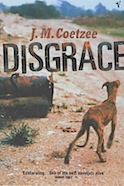 J.M. Coetzee has been following me around. I hadn’t heard of him until relatively recently, and then his name started popping up everywhere. Book-related everywheres, anyway. So when I happened to pick up Disgrace and read the blurb, I decided to give it a try, recalling how much I’ve liked South African lit in the past. And it was good. At the very least, it was a nice break from the intensity of books like The Hunger Games and Do Androids Dream of Electric Sheep?.
J.M. Coetzee has been following me around. I hadn’t heard of him until relatively recently, and then his name started popping up everywhere. Book-related everywheres, anyway. So when I happened to pick up Disgrace and read the blurb, I decided to give it a try, recalling how much I’ve liked South African lit in the past. And it was good. At the very least, it was a nice break from the intensity of books like The Hunger Games and Do Androids Dream of Electric Sheep?.
Disgrace is about different kinds of disgrace and how people deal with it and try to move on. David Lurie (who reminds me of Tomas in The Unbearable Lightness of Being), a Romantic poetry professor, has an affair with the student and gets in trouble. He refuses to cooperate with the university committee dealing with his case, and he is dismissed. He goes to visit his daughter, who lives on a farm in the country, a very unsafe place in recently post-Apartheid South Africa. One day, as she and David return home from a walk, they are robbed, and she is raped by three people. She refuses to report the rape and deals with it by herself, her own form of disgrace. David deals with it, too. There are, of course, a few subplots, one of which involves a veterinary clinic with the basic purpose of euthanizing dogs from which David learns to deal with his own disgrace.
Oprah should be all over this one. As I said, it reeks of The Unbearable Lightness of Being, which I didn’t like, though it’s not so preachy. Coetzee has his Kundera moments in which he philosophizes a bit excessively, but at least he keeps it in the mind of the protagonist rather than doing the moralizing himself.
My favorite part of the novel, and what will keep me reading Coetzee, is the prose style. It’s beautiful. It also makes for easy reading: I think I started Disgrace this time yesterday.